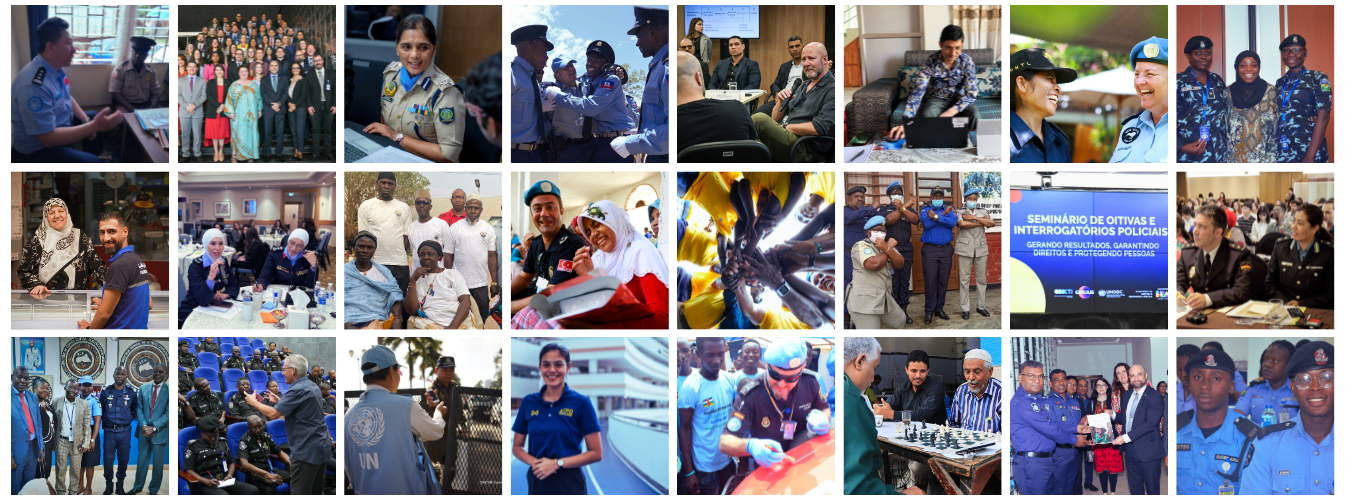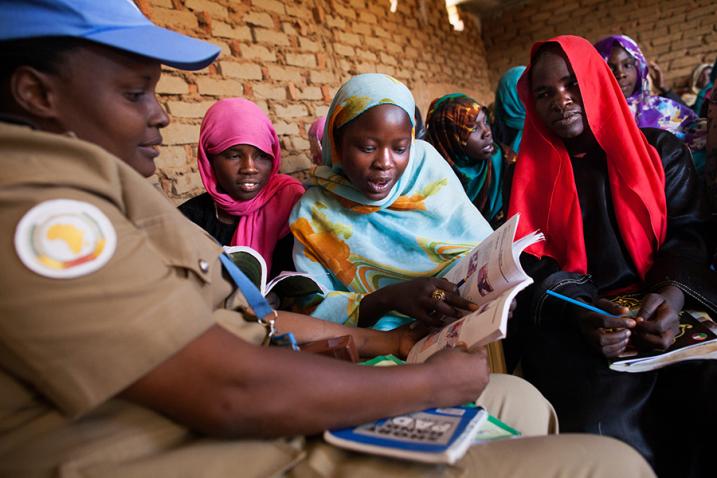Digital tools –– including AI –– offer powerful capabilities: enhancing investigations, expanding access to justice, and helping prevent crime and terrorism. Used responsibly, they can strengthen the effectiveness, transparency, and accountability of police institutions around the world."
UN Secretary-General Antonio Guterres
2025 Theme: ICT and AI in policing
In commemorating the International Day of Police Cooperation, the United Nations Inter-Agency Task Force on Policing highlights the transformative potential of Artificial Intelligence (AI) and other Information Communication Technologies (ICTs) in the field of law enforcement.
In the digital age, policing extends far beyond city streets. The contemporary threat landscape is now dominated by cyber-enabled crimes, requiring law enforcement to analyse vast repositories of digital evidence in complex cross-border cases that often blend online and offline crimes.
In the hands of malicious actors, AI tools and other ICTs are sophisticated instruments for criminal activity and effecting widespread harm at scale. Digital platforms, encrypted communications, and anonymizing tools are exploited for cyber-enabled crimes such as fraud, human trafficking, child sexual exploitation and abuse, gender-based violence, drug trafficking, terrorist and violent extremist recruitment schemes, and illicit financial flows. When powered by new technology, and in particular AI, these criminal threats are effected with a speed, scale, and stealth previously unimagined.
At the same time, the efficiencies offered by digitalization have precipitated a rapid increase in the use of new and advanced technologies in the criminal justice sector. From an operational point of view, the use of technology in policing has considerable potential to assist in prioritizing and optimizing scarce resources while also achieving improved responsiveness. The core policing functions of prevention, identification, investigation and prosecution of crime can be strengthened, for example, by AI-enabled systems for the identification and tracking of suspicious financial activities, improving biometric systems for more accurate identification of suspects, and facilitating targeted surveillance.
The responsible use of new technologies has the potential to mitigate risks of secondary victimization, corruption, torture, and abuse of power, including through the digitalization of records, the routine video-monitoring of policing practice, and the recording of statements by victims, witnesses and persons suspected or accused of crime. Additionally, the increased availability of online services and digital connectivity has significant potential to enhance access to legal information and law enforcement services, thereby strengthening equal access to justice for all – including for those who live in areas without immediate access to policing services.
While the responsible use of AI and other ICTs affords several opportunities for strengthening essential policing functions, integrating these technological capabilities into law enforcement settings is not without risks. Important concerns persist regarding transparency, bias, accuracy, reliability and the human rights implications of AI, including privacy and data protection risks. Effective policing relies on public trust. It is imperative, therefore, that concerns relating to the use of technology are addressed through transparent and inclusive processes that seek to uphold public safety, human rights, police legitimacy, and the rule of law.
In the context of this complexity, there is increasing attention at the international level to ensuring that technology is leveraged in support of criminal justice functions while safeguarding against potential human rights risks, particularly in policing and law enforcement institutions. Noting the potential for digitalization to make criminal justice systems “more effective, accountable, transparent, inclusive and responsive through promoting digitalization”, the Kyoto Declaration also cautions against improper use of such technologies, and calls for “adequate and effective safeguards to prevent the misuse and abuse of these technologies in this regard.”
In March 2024, the United Nations General Assembly adopted resolution 78/265 on “Seizing the opportunities of safe, secure and trustworthy artificial intelligence systems for sustainable development”, which calls upon Member States to develop safe, secure and trustworthy AI systems that adhere to international law and the principles of human rights. Other recent resolutions, such as 77/320 on the impact of rapid technological change and 78/132 on ICTs for sustainable development, and 79/172, on human rights in the administration of justice, frame the broader context for ensuring the safe development and use of AI.
Importantly, resolution 78/311 highlights the need for international collaboration and cooperation to build global capacity in the development and use of safe, secure and trustworthy artificial intelligence systems. Collaboration between Member States and multiple stakeholders, including the private sector, international and regional organizations, civil society, academia and technical communities, is imperative in ensuring the human rights compliant use of AI.
The 2025 International Day of Police Cooperation, under the theme “ICT and AI in policing” , also aligns with the recent adoption by the General Assembly of the United Nations Convention against Cybercrime – the first comprehensive global treaty to provide States with a range of measures to prevent and combat cybercrime, including through enhanced cooperation in the field of law enforcement.
The United Nations Inter-Agency Task Force on Policing calls for recognizing the important opportunity to reflect on and advance strategies that enhance international cooperation among law enforcement institutions globally, enabling them to effectively harness the benefits of ICTs and AI in ways that promote the rule of law, adhere to established international legal standards and safeguard human rights.
Key Documents
- General Assembly Resolution to proclaim the International Day (A/RES/77/241)
- Security Council resolution 1325 (2000) on Women, Peace and Security
Resources
About the IATF-P
Established in 2021 by the Executive Committee of the Secretary-General and co-chaired by the Department of Peace Operations and the United Nations Office on Drugs and Crime, the Inter-Agency Task Force on Policing includes 16 entities.
Its purpose is to enhance coherence among United Nations entities at a strategic level and its endeavors encompass strengthening policy standardization, planning, and coordination, mobilizing resources, and fostering dialogue with pertinent United Nations entities and other stakeholders.
The IATF-P promotes the protection of the fundamental rights of individuals sustaining and strengthening the social contract with communities where UN policing professionals are deployed as well as in our home countries. Together, the United Nations bodies working in policing serve as a valuable resource to strengthen international cooperation in the fight against crime and corruption and reestablish and preserve the principles of justice.





